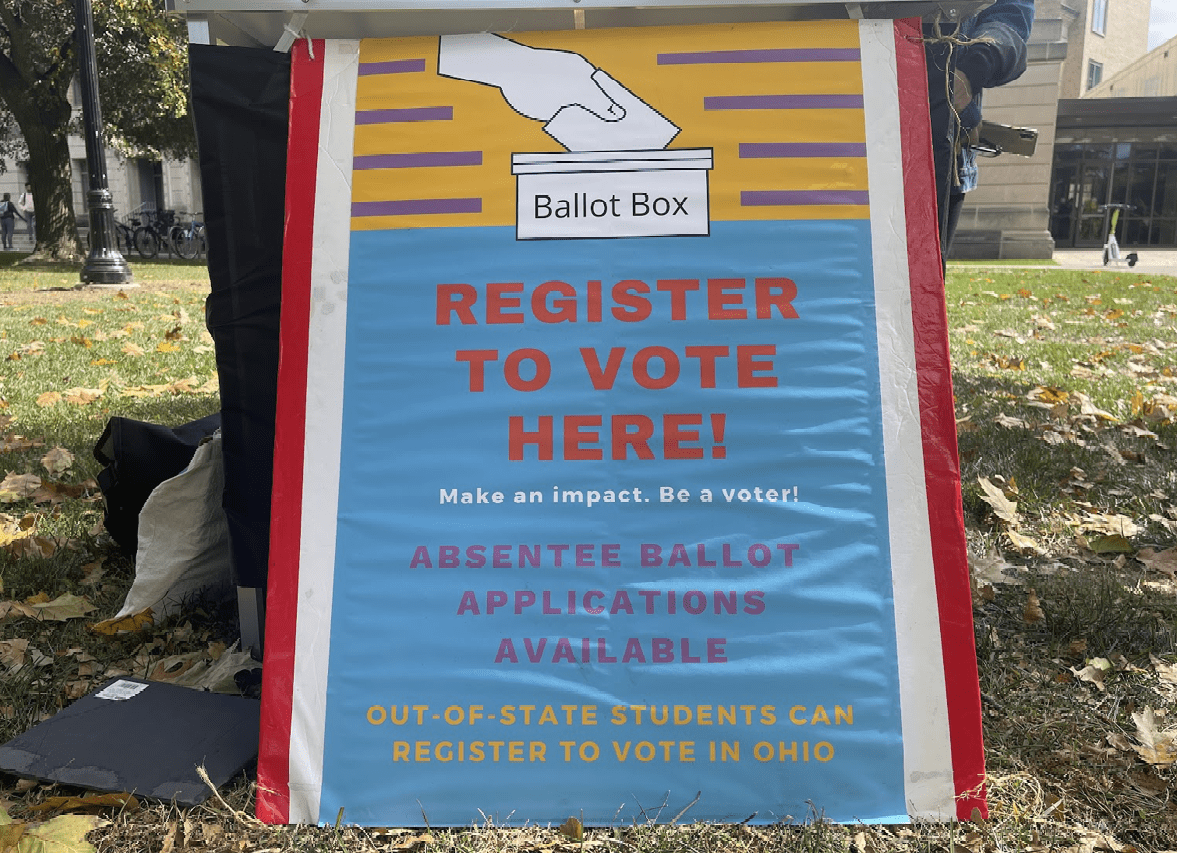
Ohio State students have until Tuesday to register to vote in November’s general election. Credit: Jasmyne Smith | Lantern Reporter
Tuesday brings Ohioans’ deadline to register to vote in November’s general election, but registration and turnout numbers for young people are up in the air this year.
Traditionally, voter registration and turnout are significantly lower for midterms than presidential elections, with the exception of the 2018 midterm elections in which over half of Ohioans cast their ballot and voters aged 18 to 29 saw a 79 percent bump in participation, according to the United States Census Bureau.
Jen Miller, executive director for the League of Women Voters of Ohio, said the turnout for young voters — who could potentially sway elections if they show up at higher rates — is often low because the voting process can be confusing to people who haven’t been properly taught how to register.
“I think the bottom line is, you know, when boomers and Gen Xers were the same age as college students are today, we were turning out at lower rates than the general voting population as well,” Miller said. “Part of that is because voting is confusing, and part of that is because as young people, you may not always realize how important elections are.”
Residents of Ohio can register to vote or update their information online or by printing out the registration form and mailing it to their county’s Board of Elections, according to the Ohio Secretary of State website.
Miller said voter turnout for every election is a crucial way for Ohioans to see solutions for issues they care about.
“If millennials and younger voters turnout out at the same rates as the rest of Ohio’s voting population, we would have very different results in elections, and we would probably see major changes in policy, like more funding for transit or more acceptance for the rights of diverse peoples,” Miller said.
Miller said all voters should keep in mind the impacts elected officials have on the lives of Ohioans, even those who opt out of voting. In a study by NextGen America, the nation’s largest youth voter organization, 53 percent of respondents said they did not know what to do in order to vote by mail.
“I know that voting is confusing, and it might not seem like it matters,” Miller said. “But the answer is not to sit out an election but to lean in because who holds office in Ohio affects our daily lives and the decisions they make can last for decades.”
Ann Shroyer, a voter registration volunteer for the social justice organization Indivisible Central Ohio, said voters should get involved and see how the lawmaking process works.
“I would encourage everyone to go to the Statehouse and watch how it works/doesn’t work,” Shroyer said. “I’ve watched lawmakers fall asleep while talking about important, what I would consider, important topics like the gun violence epidemic in the state.”
Shroyer said exercising the right to vote is vital to protecting it.
“Kids need to vote every single time if you’re 18 or over,” Shroyer said. “It’s our right, and when we don’t exercise our right, it’s going to be taken away from us.”
Haley Griggs, a third-year in political science and president of College Democrats at Ohio State, said in an email even though many people have posted about voter registration on social media, she’s not sure it will translate into increased voter turnout.
“We’ve been seeing a lot more attention on these issues on social media, but the connection to voting in local and state elections is sometimes lost,” Griggs said.
Griggs said the organization worked to register voters by touching on issues they cared about — including climate change, voting rights and gun policy reform.
Nigel Becker, communications executive for the College Republicans at Ohio State and a third-year in strategic communications and political science, said in a statement College Republicans encourage every student to register to vote, even if they don’t plan on voting.
Becker said voting is often the best way for students to ensure their voices are heard.
“As college students, we don’t always have time to attend council meetings or write letters, but voting is a quick and easy way to be heard.
Becker said students voting in local elections is important because these elections affect crime rates, housing affordability and the cost of living in the community.


